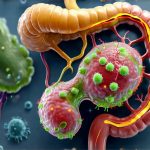The intricate connection between our gut microbiome and overall health is increasingly recognized, extending beyond physical well-being to encompass mental and emotional states. For years, researchers have understood that the digestive system isn’t merely responsible for processing food; it’s a complex ecosystem teeming with trillions of microorganisms – bacteria, fungi, viruses – collectively known as the gut microbiota. This microbial community profoundly influences various bodily functions, including immune response, nutrient absorption, and crucially, brain health. Emerging evidence suggests a significant bidirectional relationship between the gut microbiome and the brain, often referred to as the “gut-brain axis,” with implications for understanding and potentially addressing mood disorders.
The potential of probiotics – live microorganisms intended to benefit the host when consumed in adequate amounts – to influence mental health is gaining traction. While traditionally associated with digestive health, researchers are now exploring how specific probiotic strains might modulate mood, anxiety, and even depressive symptoms. This exploration isn’t about replacing conventional treatments but rather considering probiotics as a complementary approach within a broader strategy for mental wellness. Understanding the mechanisms at play and the current state of research is vital for navigating this evolving field.
The Gut-Brain Axis: A Two-Way Street
The gut-brain axis represents a complex communication network linking the gastrointestinal tract and the brain. This connection isn’t simply anatomical; it involves multiple pathways, including the vagus nerve – a major cranial nerve directly connecting the gut to the brain – immune signaling, hormonal regulation, and the production of neurotransmitters. Disruptions in this axis, often referred to as dysbiosis (an imbalance in the gut microbiome), have been implicated in various neurological and psychiatric conditions.
The gut microbiota plays a role in synthesizing neurotransmitters like serotonin, dopamine, and GABA, which are crucial for mood regulation. Furthermore, inflammation triggered by an imbalanced gut can impact brain function and contribute to mental health challenges. This highlights how maintaining a healthy gut microbiome may support optimal brain health and emotional wellbeing.
Probiotics: Mechanisms of Action
Probiotics exert their influence on the gut-brain axis through several interconnected mechanisms. They can directly modulate neurotransmitter production, impacting mood and behavior. Certain strains have been shown to increase GABA levels, promoting relaxation and reducing anxiety. Additionally, probiotics contribute to a healthier gut barrier function, preventing “leaky gut” – where substances from the gut enter the bloodstream, triggering systemic inflammation that affects brain health.
Modulation of the HPA Axis
The hypothalamic-pituitary-adrenal (HPA) axis is central to the body’s stress response system. Chronic stress can dysregulate the HPA axis, contributing to anxiety and depression. Emerging research suggests probiotics may help modulate HPA axis activity, potentially reducing cortisol levels – the primary stress hormone – and improving resilience to stress. Specific strains have demonstrated an ability to influence the release of hormones involved in stress regulation, offering a potential avenue for mitigating the impact of chronic stress on mental health.
Influencing Inflammatory Responses
Chronic inflammation is increasingly recognized as a key factor in many mood disorders. An imbalanced gut microbiome can contribute to systemic inflammation, impacting brain function and neurotransmitter systems. Probiotics may help reduce inflammation by strengthening the gut barrier, reducing the translocation of inflammatory molecules into the bloodstream, and modulating immune responses within the gut itself. Some strains have been shown to decrease pro-inflammatory cytokines – signaling molecules that promote inflammation – and increase anti-inflammatory compounds.
Neurotransmitter Production & Metabolism
The gut microbiome plays a surprising role in neurotransmitter production and metabolism. While the brain is responsible for producing many neurotransmitters, a significant portion of serotonin, for example, is actually produced in the gut. Probiotics can influence this process by directly synthesizing neurotransmitters or by altering the metabolism of precursor molecules needed for their production. This modulation could potentially impact mood regulation and emotional wellbeing. Furthermore, some probiotics produce short-chain fatty acids (SCFAs) during fiber fermentation which have neuroprotective properties and can indirectly support neurotransmitter synthesis.
The field of probiotic research in relation to mood disorders is still evolving. Current studies offer promising insights but often face limitations such as small sample sizes, variations in probiotic strains used, and differences in study designs. It’s important to remember that probiotics aren’t a one-size-fits-all solution, and the effects can vary significantly between individuals. Factors like diet, lifestyle, existing gut microbiome composition, and genetic predisposition all play a role in how someone responds to probiotic supplementation. Further research is needed to identify specific strains that are most effective for different mood disorders and to understand the optimal dosages and durations of treatment. While probiotics hold potential as a complementary approach to mental wellness, they should not be considered a replacement for conventional therapies like psychotherapy or medication prescribed by healthcare professionals. A holistic approach focusing on diet, lifestyle, stress management, and professional guidance remains paramount for supporting mental health.


















